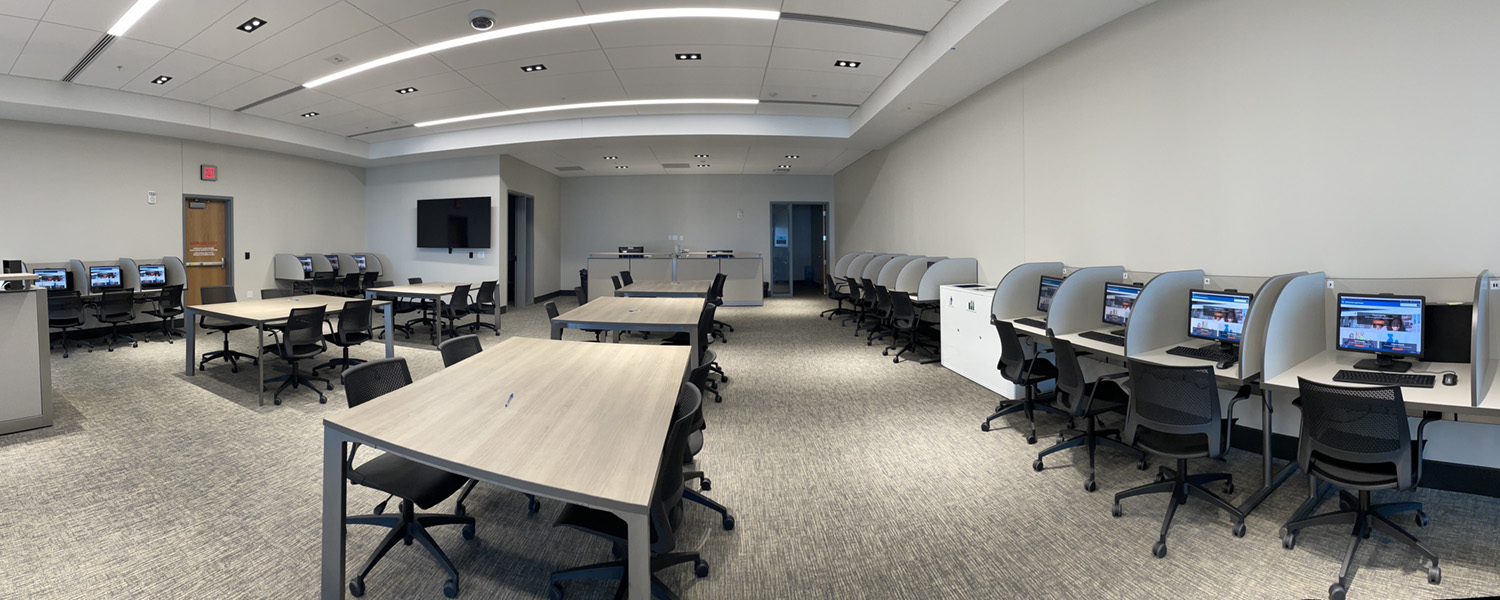by Cathrin Verano, Special Collection Development Librarian • Office of Communication, Education & Outreach
On the fourth floor of the Marion County Community Justice Campus, Court Services Manager Leigh Carpenter welcomes unrepresented individuals to the Marion Superior Court’s Legal Resource Center. Once the door has been unlocked, visitors walk past a waiting area stocked with chairs and children’s books into a large, bright space that was originally intended to be a courtroom.

Sixteen computer terminals, moveable furniture, private consultation rooms, and virtual meeting capabilities are available for their use. But perhaps most importantly, they are greeted by one of the Center’s three court navigators who are committed to listening empathetically, well-versed in court processes, and passionate about helping those trying to navigate the court system without legal representation.
“ʻSorry, we can’t help you’ is not an answer,” court navigator Peyton Barr states with fervor. Barr has a background in criminal law and is fluent in Spanish. She, along with fellow navigators Brian O’Keefe and William Brown, assist visitors to the Center with initiating cases, completing and filing forms, accessing the newly redesigned IndianaLegalHelp.org website, and understanding the status of their cases. From explaining court documents and processes in plain language to ensuring that visitors feel welcomed, heard, and supported, the navigators increase access to justice for individuals who either cannot afford or do not want an attorney.
People don’t leave upset. They may come in that way, but they don’t leave that way.
—Peyton Barr, court navigator
Visitors to the Center are often facing complicated and life-changing issues such as guardianship, protective orders, evictions, or expungements. As nonlawyers, staff may be asked for advice or counsel that goes beyond the scope of what they are able to provide. This need is filled by volunteer attorneys who sign up for two-hour blocks of time during which they are available to meet with visitors on a first come, first served basis. Most volunteer attorneys specialize in family law, but all practice areas are welcome and appreciated.
According to Carpenter, the Legal Resource Center hopes to build a base of regular volunteer attorneys to increase the number of hours during which free legal consultation is available. Carpenter reports that after finishing their first session, many attorneys find the work so rewarding that they immediately volunteer for another.

Though some seasons are busier than others—many people seek assistance with guardianship before the start of the school year, for example—the need for volunteer attorneys is consistently increasing. Carpenter reports visitors traveling from across the state for various reasons. Demand for the Center’s services has been very high from its inception, with 7,600 visitors recorded since June 1, 2022. In a single month in 2023, there were 701 visitors, of which 91 were non-English or ESL speakers.
Many unrepresented individuals rely on the Center’s resources and staff to assist them with each step of their interaction with the justice system, allowing the court navigators the opportunity to get to know them as the case unfolds. “The best part is when people come back to say, ‘it worked!’,” Carpenter says with a smile.
The best part is when people come back to say, ‘it worked!’
—Leigh Carpenter, court services manager
Efforts to increase access to justice have taken off across the Hoosier state, with one or more civil legal self-service kiosks installed in each of the 92 counties. Like the terminals in the Legal Resource Center, they provide direct access to IndianaLegalHelp.org. For Hoosiers without reliable home internet, these kiosks provide an invaluable service, increasing their access to legal aid resources and allowing them to print the forms they need to file with the court.
But what makes the Center different is the knowledge and compassion of its staff. Court navigator Brian O’Keefe enthusiastically calls his work “the most satisfying job [he’s] had in the court system.” Many self-represented participants in the court system are facing issues relating to the most important aspects of their lives, like family, housing, and employment. Understandably, stress and emotions can run high. Court navigator Peyton Barr succinctly explains that this is where Center staff truly excel: “People don’t leave upset. They may come in that way, but they don’t leave that way.”